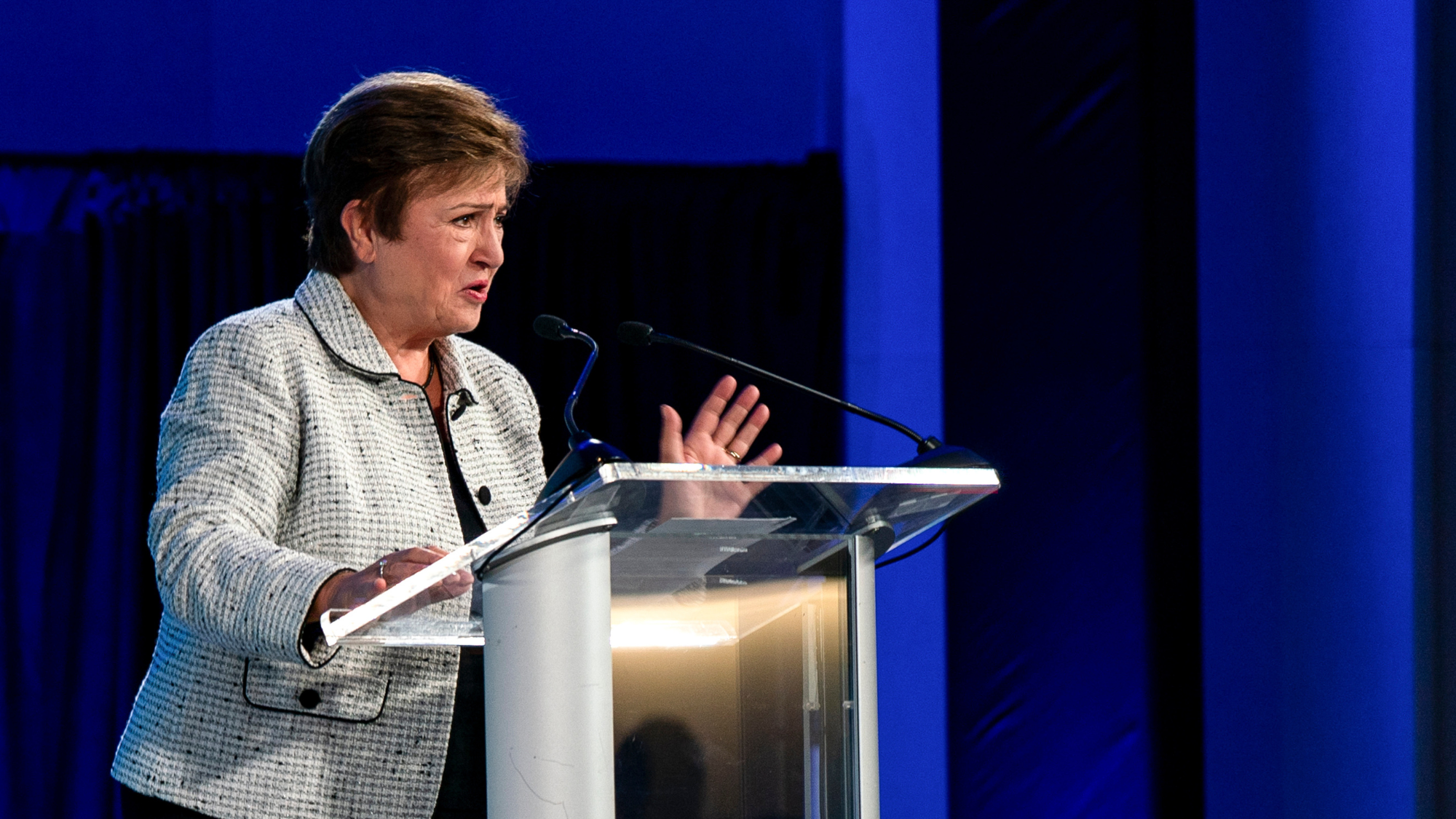The World Bank and the IMF: still fit for purpose?
Washington meeting has renewed focus on whether 80-year-old Bretton Woods 'twin' institutions are able to tackle the challenges of the future

A free daily email with the biggest news stories of the day – and the best features from TheWeek.com
You are now subscribed
Your newsletter sign-up was successful
The International Monetary Fund and the World Bank hosted their annual meetings in Washington this week, on the 80th anniversary of their foundation at the 1944 Bretton Woods Conference in New Hampshire. But the mood was hardly celebratory, said David Lawder on Reuters. Global finance chiefs gathered "amid intense uncertainty over wars in the Middle East and Europe, a flagging Chinese economy and worries that a coin-toss US presidential election could ignite new trade battles".
The IMF's latest world economic outlook was underwhelming, with an unchanged prediction of 3.2% global growth in 2024. The Fund projects it will fade to a "mediocre" 3.1% in five years – "well below its pre-pandemic trend". And the IMF predicts global public debt will, alarmingly, exceed $100 trillion by year-end. "Our forecasts point to an unforgiving combination of low growth and high debt – a difficult future," said IMF chief Kristalina Georgieva.
The mood in Washington was of "fractiousness-just-short-of-crisis", said Alan Beattie in the FT. The Fund and the Bank are "stuck in an underperforming rut" – failing to provide the finance the developing world needs, struggling to address climate change, and (as usual) issuing warnings against "protectionism". It's like "a doctor telling you to eat more healthily and exercise… It's not wrong, but it's not news."
The Week
Escape your echo chamber. Get the facts behind the news, plus analysis from multiple perspectives.

Sign up for The Week's Free Newsletters
From our morning news briefing to a weekly Good News Newsletter, get the best of The Week delivered directly to your inbox.
From our morning news briefing to a weekly Good News Newsletter, get the best of The Week delivered directly to your inbox.
Meanwhile, the shift towards global "multipolarity" was rammed home by the competing "Brics summit", hosted this year by Vladimir Putin in Russia, said Mehreen Khan in The Times. China and India made no secret of where their priorities lie. They sent finance ministers and central bankers to DC, while Xi Jinping and Narendra Modi headed to Kazan – handing Putin a "diplomatic coup". It's testament to the growing power of the Brics group and their interest in developing tools, such as a common currency, to counter "the dollarised financial system".
Still, in Washington, Brics wasn't the real "elephant in the meeting rooms", said David Lawder. A victory for Donald Trump next month could "upend the international economic system with massive new US tariffs and borrowing, and a shift away from climate cooperation". The stakes are high, said the FT – which is "why the Bank and the IMF matter more than ever". After 80 years, "the twins" badly need reform: voting power in both "remains disproportionately in the West's favour, making it harder for the pair to claim to be a truly global voice". But they remain as vital as ever. As a US treasury secretary, Henry Morgenthau Jr, observed in his closing address in 1944, "the wisest and most effective way to protect our national interests is through international cooperation".
A free daily email with the biggest news stories of the day – and the best features from TheWeek.com
-
 6 exquisite homes with vast acreage
6 exquisite homes with vast acreageFeature Featuring an off-the-grid contemporary home in New Mexico and lakefront farmhouse in Massachusetts
-
 Film reviews: ‘Wuthering Heights,’ ‘Good Luck, Have Fun, Don’t Die,’ and ‘Sirat’
Film reviews: ‘Wuthering Heights,’ ‘Good Luck, Have Fun, Don’t Die,’ and ‘Sirat’Feature An inconvenient love torments a would-be couple, a gonzo time traveler seeks to save humanity from AI, and a father’s desperate search goes deeply sideways
-
 Political cartoons for February 16
Political cartoons for February 16Cartoons Monday’s political cartoons include President's Day, a valentine from the Epstein files, and more
-
 Currencies: Why Trump wants a weak dollar
Currencies: Why Trump wants a weak dollarFeature The dollar has fallen 12% since Trump took office
-
 Elon Musk’s starry mega-merger
Elon Musk’s starry mega-mergerTalking Point SpaceX founder is promising investors a rocket trip to the future – and a sprawling conglomerate to boot
-
 TikTok: New owners, same risks
TikTok: New owners, same risksFeature What are Larry Ellison’s plans for TikTok US?
-
 Will SpaceX, OpenAI and Anthropic make 2026 the year of mega tech listings?
Will SpaceX, OpenAI and Anthropic make 2026 the year of mega tech listings?In Depth SpaceX float may come as soon as this year, and would be the largest IPO in history
-
 Leadership: A conspicuous silence from CEOs
Leadership: A conspicuous silence from CEOsFeature CEOs were more vocal during Trump’s first term
-
 Ryanair/SpaceX: could Musk really buy the airline?
Ryanair/SpaceX: could Musk really buy the airline?Talking Point Irish budget carrier has become embroiled in unlikely feud with the world’s wealthiest man
-
 Powell: The Fed’s last hope?
Powell: The Fed’s last hope?Feature Federal Reserve Chairman Jerome Powell fights back against President Trump's claims
-
 Taxes: It’s California vs. the billionaires
Taxes: It’s California vs. the billionairesFeature Larry Page and Peter Thiel may take their wealth elsewhere